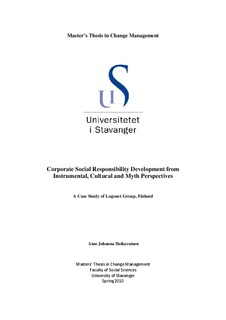Corporate social responsibility development from instrumental, cultural and myth perspectives : a case study of logonet group, finland
Master thesis
Permanent lenke
http://hdl.handle.net/11250/184502Utgivelsesdato
2010Metadata
Vis full innførselSamlinger
- Studentoppgaver (SV-IMS) [1267]
Sammendrag
Corporate social responsibility (CSR) has gained much focus in today’s societies and business
environments. An increased number of business enterprises have due to internal and external
pressures started to focus on corporate social responsibility and to explicitly address their
responsibilities. The responsibility of business is not merely to make profit. Companies are
expected to take also social and environmental impacts of their operations into consideration.
The change in attitudes and operations has taken place during the last decades in Europe, and
also in Finland which is the country of origin of the case company discussed in this thesis.
This thesis departs from accepting different understandings of the concept of corporate social
responsibility and the scope of it. CSR is seen as something essential to take in consideration
when doing business. The understanding of CSR and the path organization take in developing
CSR is discussed from three organizational perspectives. Firstly, the instrumental perspective
focuses on CSR as a conscious choice and intention of the management, and on the way these
are expressed through formal structures. From this perspective CSR is seen as a tool for
management to enhance business performance. Secondly, the cultural perspective has its
emphasis in understanding the constraints intrinsic in established traditions and cultures in the
organization. These have an impact on whether CSR will be rejected by the organizational
members or if it will have the possibility to be integrated into the core of the organization.
Thirdly, the myth perspective refers to the dominant values and norms in the environment,
which influence the possibilities for action in the organizations. CSR from this perspective
can be seen as a popular organizational recipe that is acknowledged as legitimate enhancing
the image of companies adopting it.
The method used in the empirical study of this thesis was a single case study. A Finnish
company, Logonet Group, was chosen to be a representative case due to its recent increased
focus on CSR matters and the intention to take in use CSR reporting systems. The empirical
research findings showed CSR in the company to be derived from both internal and external
pressures, the customer demands being the single most important driving force. The
understanding of CSR and the way CSR had and was planned to be implemented were a
mixture of all the three organizational perspectives. The instrumental perspective and using
CSR as a tool for management in enhancing business performance was expressed to be
important for the company. There were no negative attitudes towards CSR in the organization
and thus from the cultural perspective CSR integration into the core of the organization can be
seen as possible, however not yet present. CSR development was mainly a response to
customer requirements and the need to adopt the values and norms of the society (and the
customers) was emphasized. Thus myth perspective was much compatible with the way CSR
had gained focus in the company. Image and reputation were significant to the company and
focusing on CSR was also seen as an opportunity to enhance legitimacy.
Beskrivelse
Master's thesis in Change management
